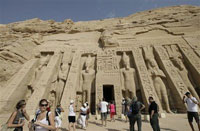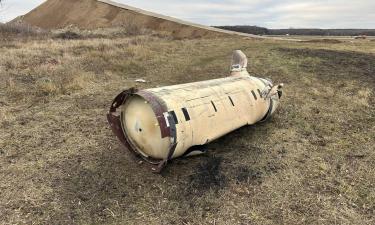Kidnappers demand millions for foreign tourists in Egypt
German authorities are negotiating with kidnappers demanding millions in ransom after they snatched 11 European tourists and eight Egyptians during a Sahara desert safari trip in a remote southwestern corner of Egypt, the Egyptian tourism minister said Tuesday.

The kidnappers, believed to be desert tribesmen, are demanding up to $15 million dollars, the Egyptian state news agency MENA reported. Egyptian and Sudanese security forces are "sweeping the area" searching for the tourists, who were likely taken over the border into Sudan, Tourism Minister Zoheir Garana said.
"We are not involved in the negotiations over the ransom. It's the German government that is responsible for whatever is related to the ransom," Garana told Associated Press Television News. Germany has not confirmed it was conducting any negotiations, saying only it has formed a "crisis team."
It was the first such abduction of tourists in Egypt, a country that was plagued in the 1990s by Islamic militant bombings and shooting against tourists. The militant violence was largely suppressed a decade ago, and Egyptian officials underlined that the kidnapping was not connected to terrorism, but was by "criminals" seeking ransom.
It was more unusual because it took place not in the well-traveled pharaonic sites along the Nile River, but at one of Egypt's most remote and little-visited natural attractions. The tourists were visiting Gilf al-Kebir, an isolated plateau in the Sahara desert famed for its prehistoric cave paintings. Armed men in SUVs snatched them on Friday while they were camping near the Sudanese border and likely took them into Sudan, Egyptian officials said.
The five Italians, five Germans and one Romanian included at least two Italians in their 70s, as well as one 68-year-old, Italian media said. The eight Egyptians seized with them were guides, drivers and at least one security guard - whose presence is required in trips to the Gulf.
Few visitors make the trek to Gilf al-Kebir, separated from the rest of Egypt by a vast plain of dunes known as the Great Sand Sea and located about 550 miles southwest of Cairo. Bigger than Delaware, it is one of the most arid places on Earth.
The plateau has become increasingly popular among adventure and eco-tourists drawn by the stark landscapes and prehistoric paintings in caves that dot the plateau. They include the "Cave of the Swimmers," immortalized in the 1996 movie "The English Patient."
It features 10,000-year-old paintings of people swimming, a hallmark of an ancient time when scientists think parts of the Sahara were covered by lakes and rivers.
The unpopulated region is a crossroads for ethnic African tribesmen - including smugglers - from Libya, Sudan and even Chad. About 100 miles (160 kilometers) further south lies Sudan's Darfur region, where near constant conflicts have given rise to armed bandits notorious for robberies and hijackings.
The kidnapping was only discovered because the Egyptian owner of the tour company, who was on the trip, was able to call his German wife by mobile phone, Garana said.
He told his wife that a group of armed men, who appeared "African," drove up to the group while they were setting up their tents, an Egyptian security official said, speaking on condition of anonymity because he is not authorized to talk to the media.
It was not clear when that phone call took place, but Italy's Foreign Ministry said the owner called his wife in Cairo again on Monday night to say they had been taken to Sudan.
Tourism is Egypt's biggest foreign currency earner. The industry was devastated in the 1990s by the militant violence but has bounced back since the campaign ended. There have been no major attacks in the capital, Cairo _ home of the Pyramids _ or the main antiquities sites in the south in more than a decade. There have been no known Islamic militant attacks in Egypt's Western Desert, where the Gilf al-Kebir is located.
But militant groups have struck since in Egypt's Sinai Peninsula, with a series of bombings of beach resorts between 2004-2006 that killed 121 people, including tourists.
Subscribe to Pravda.Ru Telegram channel, Facebook, RSS!




